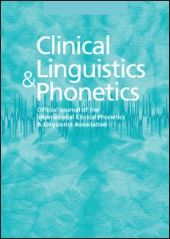Abstract
The study investigates code-switching by multilingual persons with dementia in two different speech contexts, picture naming tests and spontaneous conversation. It combines a psycholinguistic perspective on cognitive and linguistic skills with a qualitative conversation analytic approach to understanding the functions and appropriateness of code-switching in social interaction. The analysis shows that code-switching is used as a resource for compensating for word-retrieval problems in both the naming tests and in word search sequences in conversation. Furthermore, it serves to demarcate meta-communicative parentheses in which the participants comment on their process of word retrieval or express frustration about processing problems. Code-switching is generally treated as appropriate and relevant by the participants. In most instances, the speakers switch to a language known by the interlocutor. Only a few instances are treated as inappropriate by not being understandable to the interlocutor or by not adapting to the established language of the conversation. The patterns of code-switching are discussed considering typical symptoms of cognitive decline associated with dementia. Only very few instances may be interpreted as caused by a lack of awareness of the interlocutor’s language background (associated with reduced episodic memory) or a lack of inhibition. Code-switching thereby presents itself primarily as a communicative resource for handling and overcoming another dementia-related symptom, namely anomia.
